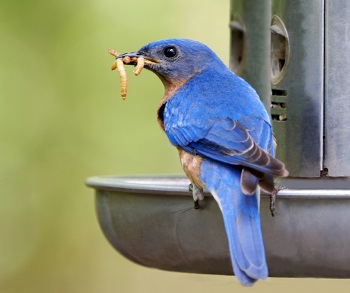Dried Mealworms - Will birds eat them?
Apr 10, 2021

You bet they will! Many of us provide dried mealworms in early summer to help the orioles and bluebirds provide wholesome nutrition to their fledglings. But, did you know that offering dried mealworms all year long offers benefits to a wide variety of backyard wild birds?
Here are 5 reasons why you should be feeding dried mealworms:
- Sarah Breuer, Lifestyle Feed Specialist, Country Visions Cooperative
April 11-17, 2021 FREE 2oz. Mealworms w/birdseed purchase
(minimum purchase of $20 bird seed/suet – 1 offer per visit)
April 11 - 17, 2021 SUPER SUET SALE Bird Tweet 10pk 2/$15 and America’s Favorite suet singles $.75
(while supply lasts)

Here are 5 reasons why you should be feeding dried mealworms:
- It’s incredibly easy! Simply mix the mealworms into your regular bird seed mix or provide alone in a dish/hopper feeder and watch the birds come eating.
- Dried mealworms are nutritious. They provide a blended balance of protein, fat, and fiber to promote healthy, vigorous birds.
- Mealworms appeal to a bird’s natural instinct. Insects, like mealworms, are a natural part of many birds’ diets.
- Attract a wide variety of birds. Serving mealworms with your seed may attract new bird species to your feeders that aren’t attracted to seed alone. Some examples of bird species that eat mealworms are: chickadees, cardinals, nuthatches, woodpeckers, and the occasional bluebird or American Robin.
- Dried mealworms do not spoil. Dried mealworms are less maintenance than live worms.
- Sarah Breuer, Lifestyle Feed Specialist, Country Visions Cooperative
April 11-17, 2021 FREE 2oz. Mealworms w/birdseed purchase
(minimum purchase of $20 bird seed/suet – 1 offer per visit)
April 11 - 17, 2021 SUPER SUET SALE Bird Tweet 10pk 2/$15 and America’s Favorite suet singles $.75
(while supply lasts)
